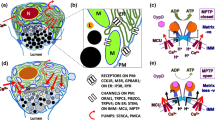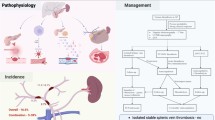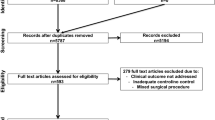Opinion statement
-
There are no drugs that cure or abate pancreatitis. The treatment of patients with mild and moderate episodes of pancreatitis (85%) is supportive and expectant. Central issues include the removal of the initiating process (if possible), relief of pain, and maintenance of fluid and electrolyte balance. Endoscopic retrograde cholangiopancreatography may be required for stone extraction in patients with biliary pancreatitis. Surgery is rarely required.
-
The aims of treatment for patients with severe disease includes treatment of local, systemic, and septic complications in addition to those for mild and moderate disease. Homeostasis is maintained by the correction of hypocalcemia, anemia, hypoalbuminemia, electrolyte imbalances, and hypoxemia. A large number of medications have been used unsuccessfully in an attempt to halt the progression of the autodigestive process within the pancreas and to reduce pancreatic secretions. Nutritional support with either enteral or parenteral feeding is given. Intravenous antibiotics or selective bowel decontamination decrease mortality in patients with severe episodes of pancreatitis. The treatment for these individuals is often prolonged.
-
Surgical treatment of traumatic pancreatitis with ductal rupture includes repair or resection. At times, simple drainage is performed and definitive surgery is deferred until later. Surgical treatment of severe pancreatitis includes debridement of necrotic and infected tissue. The emerging consensus appears to be that necrosectomy and local lavage or open management with planned re-exploration offers better survival than the conventional therapy of resection plus drainage alone.
Similar content being viewed by others
References and Recommended Reading
Werlin SL: Pancreatitis. In Textbook of Pediatric Gastroenterology, edn 2. Edited by Wylie R, Hyams J. Philadelphia: W B Saunders Co; 1999:681–694.
Windsor JA, Hammodat H: Metabolic management of severe acute pancreatitis. World J Surg 2000, 24:664–672. This paper thoroughly reviews modern metabolic management of the adult patient with pancreatitis.
British Society of Gastroenterology: United Kingdom guidelines for the management of acute pancreatitis. Gut 1998, 42(suppl):S1-S13.
Dervenis SC, Johnson CD, Bassi C, et al.: Diagnosis, objective assessment of severity, and management of acute pancreatitis. Int J Pancreatol 1999, 25:195–210.
Eatock FC, Brombacher GD, Steven A, et al.: Nasogastric feeding in severe acute pancreatitis may be practical and safe. Int J Pancreatol 2000, 28:25–31.
Kalfarentzos F, Kehagias J, Mead N, et al.: Enteral nutrition is superior to parenteral nutrition in severe acute pancreatitis: results of a randomized prospective trial. Br J Surg 1997, 84:1665–1669.
Johnson CD, Kingsnorth AN, Imrie CW, et al.: Double blind, randomised, placebo controlled study of a platelet activating factor antagonist, lexipafant, in the treatment and prevention of organ failure in predicted severe acute pancreatitis. Gut 2001, 48:62–69.
McKay C, Baxter J, Imrie C: A randomized, controlled trial of octreotide in the management of patients with acute pancreatitis. Int J Pancreatol 1997, 21:13–19.
Andriulli A, Leandro G, Clemente R, et al.: Meta-analysis of somatostatin, octreotide and gabexate mesilate in the therapy of acute pancreatitis. Aliment Pharmacol Ther 1998, 12:237–245.
Werlin SL: Endoscopic retrograde cholangiopancreatography in children. Gastrointest Clin N Am 1994, 4:161–178.
Graham KS, Ingram D, Steinberg SE, et al.: ERCP in the management of pediatric pancreatitis. Gastrointest Endosc 1998, 47:492–495.
HsuRK, Draganov P, Leung JW: Therapeutic ERCP in the management of pancreatitis in children. Gastrointest Endosc 2000, 51:396–400. This is one of the few studies that demonstrates the utility of therapeutic endoscopic retrograde cholangiopancreatography in children.
Neuhaus H: Therapeutic pancreatic endoscopy. Endoscopy 2000, 32:217–225.
Liebowitz AB, O’Sullivan P, Iberti TJ: Intravenous fat emulsions and the pancreas. Mt Sinai J Med 1992, 59:38–42.
Isenhower HL, Mueller BA: Selection of narcotic analgesics for pain associated with pancreatitis. Am J Health-Syst Pharm 1998, 55:480–486.
Thompson DR: Narcotic analgesic effects on the sphincter of Oddi: a review of the data and therapeutic implications in treating pancreatitis. Am J Gastroenterol 2001, 96:1266–1272.
Golub R, Siddiqi F, Pohl D: Role of antibiotics in acute pancreatitis: a meta-analysis. J Gastrointest Surg 1998, 2:496–503.
Sharma VK, Howden CW: Prophylactic antibiotic administration reduces sepsis and mortality in acute necrotizing pancreatitis: a meta-analysis. Pancreas 2001, 22:28–31.
Quest L, Lombard M: Pancreas divisum: opinio divisa. Gut 2000, 47:317–319.
Lugo-Vicente HL: Gallbladder dyskinesia in children. J Soc Laparoendoscop Surg 1997, 1:61–61.
Lehman GA, Sherman S: Sphincter of Oddi dysfunction. Int J Pancreatol 1996, 20:11–25.
Petersen C, Goetz A, Berger D, et al.: Surgical therapy and follow-up of pancreatitis in children. J Pediatr Gastro Nutr 1997, 25:204–209.
Mier J, Lean EL, Castillo A, et al.: Early versus late necrosectomy in severe necrotizing pancreatitis. Am J Surg 1997, 173:71–75.
Tagge EP, Tarnarsky PR, Chandler J, et al.: Multidisciplinary approach to the treatment of pediatric pancreaticobiliary disorders. J Pediatr Surg 1997, 32:158–165.
Morris-Stiff GJ, Bowrey DJ, Oleesky D, et al.: The antioxidant profiles of patients with recurrent acute and chronic pancreatitis. Am J Gastroenterol 1999, 94:2135–2140.
Schulz HU, Niederau C, Klonowski-Stumpe, et al.: Oxidative stress in acute pancreatitis. Hepatogastroenterology 1999, 46:2736–2750.
Author information
Authors and Affiliations
Rights and permissions
About this article
Cite this article
Werlin, S.L. Acute pancreatitis in children. Curr Treat Options Gastro 4, 403–408 (2001). https://doi.org/10.1007/s11938-001-0005-7
Issue Date:
DOI: https://doi.org/10.1007/s11938-001-0005-7




